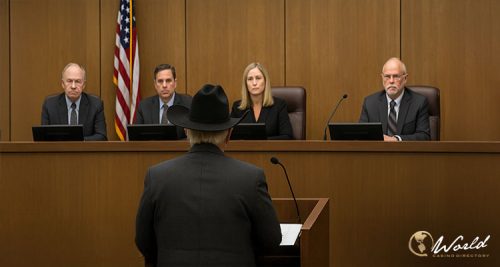Great Britain’s Gambling Commission has handed a £650,000 ($849,168) fine to Videoslots after ruling the online gambling operator breached several rules and regulations on anti-money laundering (AML) and social responsibility.
Videoslots, which runs Videoslots.co.uk, MrVegas.com and Megariches.com, will make the payment in lieu of a £2 million financial penalty. It was also issued with a formal warning and ordered to undergo a third-party audit to ensure it is effectively implementing AML and safer gambling policies.
The Commission said failings were identified for the period from October 2019 through to February 2022. Videoslots was ruled to not have complied with certain Licence Conditions and Codes of Practice (LCCP).
These include paragraph three of licence condition 12.1.1, which says licensees must ensure money laundering policies and procedures are implemented effectively. These should also be reviewed and revised appropriately to ensure that they remain effective.
Videoslots was also found to be in breach of paragraphs 1a, 1b and 2 of Social Responsibility Code Provision (SRCP) 3.4.1. These require licensees to identify and interact with customers to minimise the risk of gambling harms.
“Social responsibility failures stemmed primarily from a reliance on systems that did not effectively monitor customer activity to identify harm or potential harm associated with gambling,” the regulator said.
“The Commission’s investigation determined that although the operator’s monitoring systems automatically set a monthly deposit limit for customers, that limit ran across a calendar month and did not include the customer’s initial deposit.”
Videoslots users lost thousands despite deposit limits
Setting out some of the issues identified at Videoslots, the Commission flagged one user who lost £5,000 in a month. This was despite the same player having in place a £3,000 monthly deposit limit.
Another customer lost £5,000 in less than 24 hours despite a £3,000 monthly deposit limit, while a further customer lost £7,500 over 18 days despite a £2,000 monthly deposit limit.
The Commission also raised concerns over the monitoring systems deployed by Videoslots. It said these did not effectively identify customers who were potentially at risk of gambling harm. One player did not receive interaction from the operator despite losing £6,550 in three active days across a two-month period.
‘Gaps’ in Videoslots’ AML and countering terrorist financing
Meanwhile, the regulator found issues with Videoslots’ AML/Countering Terrorist Financing (CTF) policies and procedures. These included record management omissions and an over-reliance on an algorithm to identify and monitor customer behaviours, which the regulator said appeared “ineffective” in some instances when tested.
One example was a customer who demonstrated a high level of depositing and gambling activity over a 16-day period. The user funded their account with digital pre-payment vouchers, totalling in excess of £75,000. After gambling, proceeds were transferred to four different bank accounts, while the same customer was found on occasion to be accessing their account from outside Britain.
The commission said despite these high-risk factors, the user’s automated AML risk score did not trigger the threshold for Videoslots to request source of funds information in a timely manner. This led to “unacceptable” delays in an account review and an absence of “effective customer due diligence and effective oversight”.
“One of the key failures was that the automated scoring system in place at the time did not identify the activity as high risk,” the Commission said. “There was a presumption that the activity was funded from recycled winnings without any supporting evidence to explain why the customer was adopting a complex and unnecessary deposit and withdrawal pattern.”
In another case, a player’s risk profile was not appropriately escalated despite high deposit and withdrawals during a certain month. According to the Commission, Videoslots relied on the fact the player had significant wins and assumed the account was funded from recycled winnings. This was “without sufficient scrutiny or any acceptable form of interaction” to validate this assumption.
Commission updates open-loop payment systems advice
Commenting on the case, John Pierce, director of enforcement at the Commission criticised the over-reliance on ineffective systems. He said controls were not applied to the standards expected by the regulator.
“The investigation identified a serious example where pre-paid digital vouchers had been used for gambling without effective oversight and early intervention,” he said. “The over-reliance on an algorithm to monitor risk meant that the customer was able to carry out a high volume of deposits and transfer the proceeds of gambling to multiple different destination accounts with insufficient and timely checks or robust source of funds verification taking place.”
Pierce also flagged the acceptance of digital vouchers as a method of payment. He said this requires “robust controls” from a safer gambling perspective, particularly where it is possible to purchase digital vouchers using credit or crypto via third-party websites
“Open-loop payment systems are high risk in nature because they could enable anonymous deposits and make it harder to trace funds,” he said. “In this case, the licensee failed to implement timely customer interactions and did not conduct enhanced customer due diligence until the customer had reached significant spend thresholds. Such failings are unacceptable.
“Operators must review how open-loop payment systems such as prepaid digital vouchers are managed in a gambling environment. This is because they are high risk and present operational challenges in terms of effective monitoring.
“While our position on the use of open loop payment systems has not changed, we have updated our risk information to reflect our concerns about digital vouchers.”
Another financial penalty for Videoslots
This marked the second large financial penalty for Videoslots in 2025. Back in April, it was ordered to pay SEK12 million ($1.3 million) by Sweden’s Spelinspektionen for failing to counteract excessive gambling.
Videoslots employs an automated system to monitor bettors’ behaviour, which triggers when certain risk indicators are met. It also prevents users from making further deposits when certain thresholds have been reached. However, Spelinspektionen ruled 12 players were gambling excessively and Videoslots’ attempts to halt such activities were insufficient.
Meanwhile, in Great Britain, the Gambling Commission has been clamping down on other operators that have breached regulations. These include NetBet, which was ordered to pay £650,000 earlier in November, also due to AML and social responsibility failings.
Elsewhere, Spribe OÜ’s software licence was suspended for failing to comply with hosting requirements. The Commission said this was necessary on “grounds of suitability” due to “serious” non-compliance. In addition, the regulator suspended the operating licence of VGC Leeds Limited, which operates the Victoria Gate Casino land-based venue in Leeds, England.

 4 days ago
25
4 days ago
25






















